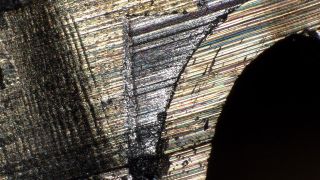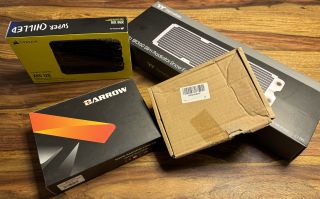New AIO radiator testing reveals lead and other substandard materials — Caseking halts Barrow Dabel product sales in response
Igor's Lab found "huge amounts of lead" in one of the coolers.

Last week we covered Igor's Lab materials science investigations into six AIO liquid cooler radiators. Igor has followed up by dissecting four more models. Interestingly, this time he found one radiator featured such heavy use of lead that he comments, "Sales in the EU should be stopped immediately." Wallossek reached out to German tech retailer Caseking about the problematically toxic and RoHS-violating Barrow Dabel 28b Slim 120mm, and it has removed all Dabel series products from sale until its own investigations are completed.

The four new radiators tested by Igor's Lab include the aforementioned Barrow Dabel 28b Slim 120mm, the Corsair Hydro X-Series XR 5 120mm, the Thermaltake Pacific SR-Series 360, and the Kafuty Aluminum radiator 120mm. Igor put the radiator component materials through his exhaustive testing regime, checking the radiator chambers, inserts, channels, cooling fins, solder, and screws for composition. He also provides comments on the cooling liquids and product workmanship.
Of the new radiators tested, only the Corsair passed with flying colors. We have reviewed many Corsair AIOs and they have a name to live up to, so it isn't that surprising they are among the best-rated here. The only potential cause for concern highlighted was that some component materials (channels, chambers) weren't listed in the official specs.
Both the Thermaltake and Kafuty brands also fared quite well, though they both drew fire for having paint residue in the inlet channels. With these latest four radiators, Igor didn't have such harsh criticism regarding brands claiming to use one material but instead using another (often cheaper) option.

Last but not least, the analysis of the headlining Barrow Dabel radiator is perhaps the most interesting. The Barrow's spec sheet and the actual materials used seemed to be in line, but no mention was made regarding the solder material. Igor's Lab tests revealed that the Dabel radiator solder was 70% lead, and it is used as both a solder and filler material. That is "far too much," according to Igor, and would cause alarm at consumer safety and standard organizations like Germany's Federal Environment Agency (UBA).
After I found considerable amounts of prohibited lead in the radiator of the Barrow Dabel 28b Slim 120 mm, I naturally informed Caseking in advance Caseking immediately reacted in an exemplary manner by suspending the sale of the offending model.https://t.co/vQX2aWdJG3 pic.twitter.com/wSkz6zVwhmMarch 12, 2024
Happily, distributor Caseking has swiftly withdrawn all its Barrow Dabel radiator products from sale. It will be accepting customer returns "regardless of the date of purchase and the purchase price." Caseking also said it would be liaising closely with Barrow about the issue. This is one more reason that it is wise to use 'local' retailers rather than global outlets like Aliexpress.
Stay On the Cutting Edge: Get the Tom's Hardware Newsletter
Get Tom's Hardware's best news and in-depth reviews, straight to your inbox.

Mark Tyson is a news editor at Tom's Hardware. He enjoys covering the full breadth of PC tech; from business and semiconductor design to products approaching the edge of reason.
-
Gururu Is this a case about where they are made or is it a case of over reaction since lead in this capacity shouldn't be toxic to the people around it?Reply -
pbcrunch I don't think anyone should be licking or eating a radiator, but the lifetimes of these parts are finite. At some point a radiator full of leaded solder is going to end up in the garbage.Reply -
Dantte I loved the last article, this one too; my question and would make this even better is if anyone, Tom's, following up with these manufacturers? I feel like I'm only getting one side of the story here.Reply
I mean in the case of EKWB, I keep going back this manufacturer because their website STILL clearly states "Copper H90 tubing" but Igors testing says that is not true. This is FALSE ADVERTISING on the side of EKWB and ILLEGAL in the USA, or Igor is slandering the company. Its one or the other and this has not been brought up yet?
Kids are eating Tide pods and (8) have died between 2012 and 2017... I am of the opinion we remove all safety standards and let Darwin sort it out :)pbcrunch said:I don't think anyone should be licking or eating a radiator, but the lifetimes of these parts are finite. At some point a radiator full of leaded solder is going to end up in the garbage. -
Notton I did a brief look into EU RoHS law, but it said that if you violate it, you can face fines or imprisonment.Reply
Seeing as Germany is in the EU, I would guess the store thought it would be wise to pull all products so they don't face penalties. -
TechLurker I wonder if there's a way to ask him to review some radiators off FormulaMod, ranging from the high-end like the Granzons to the cheap budget ones. Especially since many of them are being recommended across watercooling threads and posts as cheaper alternatives to longer-established brands, and in the case of the Granzons and some of their mid-range options, also feature neat ideas like integrated pumps which some (like myself) are using to save some space.Reply -
Alvar "Miles" Udell I'd be more concerned that the lead may leach into the (presumably non-conductive) coolant and make it conductive, which could cause a short in the event of a leak.Reply -
BleuCheddar Aren't these just radiators? AIO is "All-In-One" meaning radiator, pump, CPU block, tubing and reservoir?Reply
Kinda missing a few things to call them AIO? -
Avro Arrow Every time I hear or read something about a problem with an AIO, it only serves to tell me that I was right to just use an air cooler. It cost me (literally) nothing, works just fine, has only one moving part (the fan) and has no fluid that can leak or become contaminated.Reply
Unless you have a late model Intel i9 or high-end i7, there is literally no reason to use an AIO. For those who just have one for looks, that's >$100 that you could've invested into something that actually improved performance or storage capacity. It makes no sense to me. -
Eximo Reply
This happens pretty much immediately with all metals inside of a water cooling loop. Once the coolant has been in there for a few minutes you will see a rise in conductivity.Alvar Miles Udell said:I'd be more concerned that the lead may leach into the (presumably non-conductive) coolant and make it conductive, which could cause a short in the event of a leak. -
ivan_vy Reply
it's more about damage control on the branding. Igor Walloseek was editor-in-chief and main author of the German edition of Tom's Hardware between January 2017 and April 2018, a very respectable reviewer.Gururu said:Is this a case about where they are made or is it a case of over reaction since lead in this capacity shouldn't be toxic to the people around it?
anyway kudos for the brand for acknowledge its problem.
Most Popular






